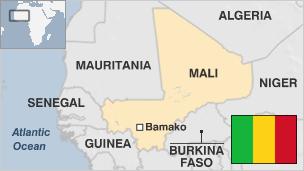

-
21 May 2015
- From the section Africa

The landlocked West African country of Mali – one of the poorest in the world – experienced rapid economic growth after the 1990s, coupled with a flourishing democracy and relative social stability.
This all hung in the balance in early 2012, when the steady collapse of state control over the north of the country was followed by an inconclusive military coup and French military intervention against Islamist fighters who threatened to advance south.
Although civilian rule was re-established in the summer of 2013, a fragile truce with Tuareg separatists broke down amid resumed fighting a year later.
For several decades after independence from France in 1960, Mali suffered droughts, rebellions, a coup and 23 years of military dictatorship until democratic elections in 1992.
The core of ancient empires going back to the fourth century, Mali was conquered by the French in the middle of the 19th century.
After a brief experiment in federation with Senegal, Mali became independent in 1960.
Although swathes of Mali are barren, the country is self-sufficient in food thanks to the fertile Niger river basin in the south and east.
It is one of Africa’s major cotton producers, and has lobbied against subsidies to cotton farmers in richer countries, particularly the US.
A chronic foreign trade deficit makes it nonetheless heavily dependent on foreign aid and remittances from Malians working abroad.
War in the north
In the early 1990s the nomadic Tuareg of the north began an insurgency over land and cultural rights that persists to this day, despite central government attempts at military and negotiated solutions.
The insurgency gathered pace in 2007, and was exacerbated by an influx of arms from the 2011 Libyan civil war.
The Saharan branch of al-Qaeda was quick to move into this increasingly lawless area, and seized control of the Tuareg north after the March 2012 military coup, effectively seceding from the rest of Mali and establishing a harsh form of Islamic law.
The West African regional grouping Ecowas agreed to launch a coordinated military expedition to recapture the north at a meeting in Nigeria in November, with UN backing.
But with preparations expected to take several months, the Islamists took the initiative and began to advance towards the government heartland in the south-west.
Alarmed at the capture of the town of Konna, the government in Bamako asked France to intervene militarily. French troops rapidly overran Islamist strongholds in the north, ending the major part of the insurgency. The north remains tense, however, with both Tuareg separatists and Islamists sporadically active.
Music stars
Despite its political travails, Mali is renowned worldwide for having produced some of the stars of African music, most notably Salif Keita. The annual Festival in the Desert has traditionally celebrated this talent.

